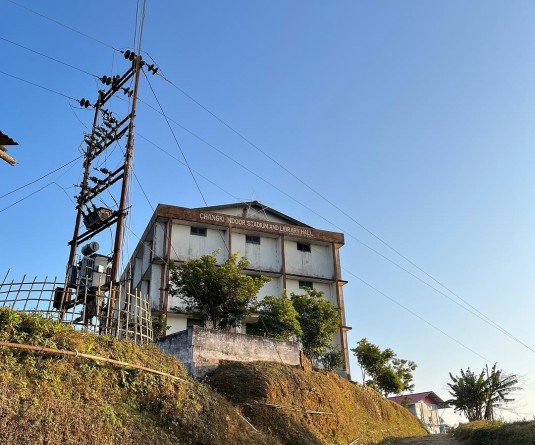
Atokhe Aye, SDO (Civil) Dhansiripar along with the officials and others during the awareness programme on February 21.
Dimapur, February 21 (MExN): Delivering the message that water and sanitation are among the most basic human needs, Dhansiripar PHED Sub-Division Office conducted an awareness programme on February 21 to commemorate the ‘National Rural Drinking Water and Sanitation Awareness Week.’
Atokhe Aye, SDO (Civil) Dhansiripar was the chief guest. Speaking on the significance of the week, the chief guest explained, in nagamese dialect, the message from Water & Sanitation Support Organization (WSSO) PHED Nagaland.
“Water has always been an important life sustaining to all living beings but can also destroy us if our water sources are contaminated. The safe water is that water free of chemical and bacteriological contamination. Regardless of where potable water comes from, number of impurities can contaminate water,” Aye said. “Consuming of unsafe water can lead to several diseases like nausea, fever, diarrhea dehydration, typhoid, hepatitis A (Jaundice), worm infections and long exposure can cause rashes, a number of immune, neurological, development and reproductive problems,” Aye added.
While informing that the PHE department has set up Water Testing Laboratories in all the eleven districts of the State, Aye encouraged everyone to avail the opportunity to test water from the laboratories where experts like the PHED officials and chemist who are available to extent their service.
Stating that water and sanitation are co-related, Aye said sanitation is not only the construction of toilets for safe disposal of excreta but to keep ourselves, surrounding/environment clean so that conducive condition is created for good personal and community health there by inculcating the habit of cleanliness as a way of life. It further stated that in social development, lack of toilets affects people’s dignity, privacy, status and safety. 80 % of the diseases in the developing nations are due to water borne and excreta related diseases. Studies have shown that washing of hands with soap before meal after defecation and safe disposal of child excreta has reduced the incident of Diarrhea Morbidity by almost 50 % and child morality by 55 %.
Underlining the importance of good health, the message stated that unhealthy surrounding, unhygienic condition such as open defecation, stagnation of water becomes the breeding place of Mosquitoes and other insects, which become the carriers of diseases and directly transmit to the human. “Preserve our nature especially our forest as we all know that ‘Conservation of Forest is Conservation of Water.’ Treat water with respect because water is life,” Aye quoted the message in conclusion.
As per the order of the programme, Er Imkongneken Jamir, JE (PHED) was the chair; Puna Imsong, secretary, Ao Baptist Church Dhansiripar said invocation prayer; N Rengma, WATSAN secretary Dhansiripar hq delivered exhortation, vote of thanks by Er Sentimeren, SDO (PHED) Dhansiripar Sub-Division and benediction by Thungbentung, youth director, UBC Dhansiripar. The programme was attended by village WATSAN committee chairman and secretary.





